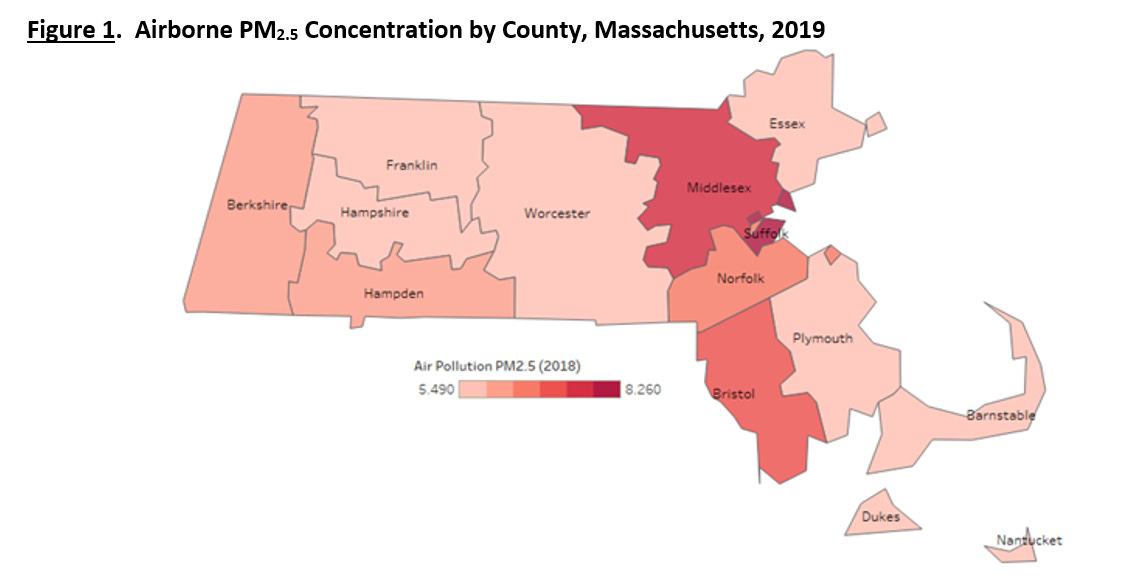New research details effects of air pollution in Massachusetts
An estimated 2,780 people died in Massachusetts from air pollution in 2019. A new report shows the effects town by town.
As the climate crisis rages on, a new study from the Boston College Global Observatory on Planetary Health sheds light on an often-overlooked consequence of the fossil fuel economy: the massive health effects of air pollution.
Published Sunday in Environmental Health, the researchers found that air pollution killed an estimated 2,780 Massachusetts residents in 2019 alone, which surpasses the annual opiate overdose deaths in the state. Essentially all of this air pollution comes from burning fossil fuels.
According to the Lancet Commission on pollution and health, air pollution killed 6.7 million people globally in 2019. The majority of these deaths occurred in developing countries in the Global South, but even in the United States, almost 200,000 people die prematurely from air pollution each year.
This new report provides us with the most localized look at the deadly effects of air pollution in Massachusetts, estimating impacts town-by-town based on publicly available data. It also pioneers an approach that could be used to study air pollution impacts in other states.
I spoke with lead author Philip Landrigan about the findings of this study, and about how the Commonwealth can use these results to better protect residents. Landrigan is the director of the Global Observatory on Planetary Health at Boston College, and previously served as the co-chair of the Lancet Commission on pollution & health, which studies mortality and health impacts from air pollution on a global scale.
Landrigan emphasized that air pollution still poses a major threat to Bay State residents, despite massive progress the state has made over the past 50 years.
“Premature deaths occur in practically every city and town across Massachusetts,” said Landrigan. “Children in practically town and city across the state are suffering IQ loss due to air pollution exposure in the first years of their lives.”
While all residents face some level of health risks from pollution, these risks are frequently elevated in low-income communities and communities of color.
“These are communities that have big roadways going through them, inner-city communities, communities with industrial plants in them — so-called environmental justice communities,” said Landrigan. “Those communities are absolutely the hardest hit”
Figures republished with permission of the lead author.
Along with elevated levels of mortality, the researchers also found that air pollution caused an average loss of over 2 Performance IQ points per child in the state, along with over 15,000 cases of pediatric asthma.
In the future, Landrigan hopes that researchers will be able to collect more localized data to better understand how health impacts are unequally distributed among different communities within cities and towns.
“Boston is not uniformly polluted,” said Landrigan. “There are some parts of Boston – Roxbury, Dorchester, parts of East Boston – that are quite heavily polluted. But there’s also some fairly green parts.”
Overall, Suffolk County has highest levels of pollution in the state. Notably, all county air pollution averages in the state were within EPA standards, but were mostly above the recently lowered guidelines of the World Health Organization.
Researchers at BC’s Global Observatory on Planetary Health have also developed an online database that allows the public to explore air pollution levels and health impacts in each town.
To help combat the issue, the study prescribed a set of policy suggestions to help protect residents from air pollution. These include blocking construction of new gas pipelines, banning gas hookups in new buildings, installing solar panels on municipal buildings, and tightening federal air quality standards.
“We know technologically how to do it — what’s going on now is that the fossil fuel industry is fighting back very hard trying to slow the transition to renewables,” said Landrigan. “The current [Baker] administration has been very loath to use the power of the state to block pipeline construction … I’m hoping that the new administration that comes in in January will be more aggressive and will take action to wean us off fossil fuels.”
New England climate news roundup
Connecticut
New research shows that summers are getting longer and hotter in Connecticut (CT Patch)
CT is now offering up to $15,000 in incentives for electric vehicles (WTNH)
Maine
The Portland City Council calls for the halting of a proposed highway project, citing climate concerns (Portland Press Herald)
Maine struggles to find housing for refugees, many fleeing climate-fueled disaster (CSMonitor)
Massachusetts
The 90% of Massachusetts faces drought conditions as climate change makes droughts more frequent and severe in the state (Boston Globe).
Boston area hospitals pledge to cut carbon emissions, but still lag behind goals (Boston Globe)
New Hampshire
Climate change worsens toxic blue-green algal blooms in New Hampshire (NHPR)
Residents of the NH coast cope with increasing climate effects (New Hampshire Bulletin)
Rhode Island
The Rhode Island state government recently signed into law the most aggressive renewable energy targets in the county (AP News)
Vermont
UVM researchers have released maps projecting how floods will affect the landscape (ecoNEWS VT)
A new program from the Nature Conservancy and American Forrest Foundation will pay small-scale landowners to sequester carbon on their property (PRWeb)





